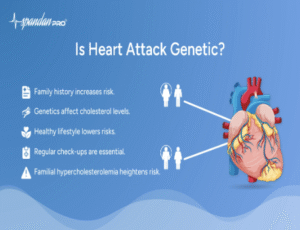

In truth, the risk of heart attacks is significantly influenced by genetics. An established risk factor is a family history of heart disease, especially heart attacks or early coronary artery disease (CAD). A person's susceptibility to heart attacks can be considerably increased by genetic predisposition, even though lifestyle and other variables also play a role!!!

Among other things, our genes determine our blood type, physical appearance, and even the risk to certain diseases. Heart disease is a serious issue, as it is the primary cause of death in the US. Is there any chance that your genes are making you even more prone to this fatal medical condition? There is no doubt that cardiovascular risk is inherited, he says. "You are more likely to have heart attack or coronary artery disease if you have a parent or sibling who has the condition." For instance, you are more likely to have a heart attack if your mother had one before the age of 55 or your father has one before the age of 45. The risk of heart disease can be influenced by several biological factors in addition to these inherited genes. For instance, there is evidence that African Americans are more likely to have high blood pressure and diabetes, which may be signs of a propensity to heart failure and coronary heart disease (Sachin Parikh, 2013).
How does a family history of heart disease increase your risk?
Your family history may raise your risk of heart disease in several ways.
1. Inherited Genes: You might have inherited heart disease-causing genes. Though no single gene is responsible for heart disease, several genes can cooperate to raise your risk of getting it. High blood pressure, high cholesterol, and other risk factors can be inherited due to certain genes.
2.Shared Environments: Additionally, you may inherit shared environments from your family's preceding generation. You might have picked up eating patterns or lifestyle behaviors, including a sedentary lifestyle or a fondness for foods (Heart Foundation, 2024).
There are numerous ways in which genetics can affect the risk of heart disease. From the strength of the blood arteries to the communication between the heart's cells, genes govern every element of the cardiovascular system. One gene's genetic variant (mutation) can influence a person's risk of heart disease. An increased risk of clogged arteries can result from a genetic variant that alters the function of a certain protein, for instance, causing the body to metabolize cholesterol differently. The DNA of eggs and sperm contains genetic differences that are handed down from parents to their children. During development, every cell in a child's body receives a copy of the genetic information from their parents.
The inherited disorders that cause sudden cardiac death and arrhythmias are very well understood. Arrhythmogenic right ventricular cardiomyopathy (ARVC) and hypertrophic cardiomyopathy are both capable of producing fatal arrhythmias. Numerous hereditary conditions can result in arrhythmias and abrupt cardiac death. The more common ones include Atrial Fibrillation, Brugada Syndrome, Catecholaminergic Polymorphic Ventricular Tachycardia, Long Q-T syndrome, and short Q-T syndrome (University of Ottawa Heart Institute, 2018).
Symptoms of Inherited Cardiovascular Disease:
With cardiovascular genetic diseases, there may be several signs and symptoms that families may not know about. If symptoms do appear, they may include:
Diagnosis of Inherited Cardiovascular Disease:
Some of the diagnostic tests and procedures include:
Treatment of Inherited Cardiovascular Disease:
Treatment options include:
Lifestyle Changes –
Medications for Cardiomyopathy and Arrhythmias -
Medical and Surgical Procedures –
REFERENCE:
Photo by engin akyurt on Unsplash
